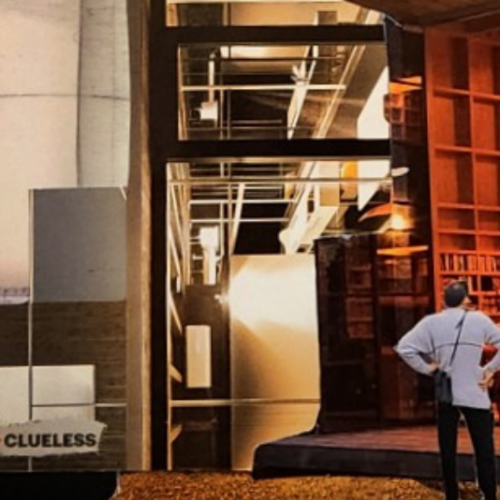One childhood summer morning in Maine by the lake, I lay in my top bunk studying the creatures formed by knots in the pine board walls. One resembled a bat spreading its wings, another a bull snorting out steam. I contemplated the knots like puzzles, just awake in that time my sister and I called “glazing,” when the brain is half cobwebbed and full of molasses from the dream world, and time is crystalline and oozing. I slept by the long window ajar to the forest canopy. An idle movement of air carried in an aquatic and earthy scent as the humid breath of the lake filtered up through the hemlock forest toasted by morning light shafts. Thrushes and other woodsy songbirds chirped and thrummed. I awoke with promise back then, with little weighing on my mind, with no memory of internal struggle. I awoke with simple wonder at a summer’s day. Nothing was planned—no scheduled activities, no checklists. We just let the day flow. This morning could have been a specific day or any number of days layered on each other, similar movements and actions stacked into one congealed slice of time.
When fully awake, I launched from the bunk, burst out the bedroom door with its black forged handle, leapt across the hallway, plunged down the pine stairs, dashed towards the green screen door, flung it open to land on the front deck, then waited for the satisfying thwap of the door behind me. I previewed the lake’s surface between the trunks of the hemlocks. What kind of a day was it? Was it a day white-capped and fresh with dry, blue, fluffy air that pulled your hair in all directions? Was it a thick, gentle, humid day without movement recorded on the smoothed, gray surface? Did it smell of sunscreen already, extroverted and moving with bright adventure? Flitting barefoot down the slightly curved path littered with large rocks and roots, I choreographed a hopping, side-stepping dance around obstacles. Reaching the creaking and groaning dock, I finally absorbed the lake laid out with the glory and freedom of wide-open sloshing.
Maybe we went to the beach that day, or what passed for a beach at this lake, crushed up pebbles just more refined than gravel where a footprint left a divot like a large hoof. We all piled into the Boston Whaler and prepared to sing at the top of our lungs, the wind whisking away any nonsensical verses or stray notes. Maybe we went to Packard’s, an old camp across the lake that supplied boat gas, fishing supplies, mail, and most importantly, candy.
Packard’s rested near the end of a small cove marked by a house built to resemble the white tower of a castle. Sighting the turreted beacon from afar, we navigated at top speed across the lake, our hair straight out behind us. Once in the cove, the motor fell into a congested rumble as we observed the “no wake zone.” A suffocating, baking sun replaced the refreshing chill of the boat wind, and our hair bobbed around us in a ridiculously frizzy aftermath. The camps lining the cove and crowding the water’s edge were built in the 1920s before anyone cared about zoning. The porch-sitters waved to us, the porch stilts dipping their toes in the lapping water.
After pulling up at a dock spot and inexpertly winding ropes around the cleats, we wandered up to the camp through the closely clipped, rolling front lawn that spread out from the shaded and creaking porch. My dad always had something to say to Gerry, the owner, while picking up the mail. A conversation about the weather could spin out into eons of analysis into the lack of, or excess of, rain or sun or wind this summer. There was always something different about this summer.
While they picked at the strings of conversation, swaying from side to side, leaning back, arms folded, my sister and I chose our candies and checked on our favorite objects. I liked to pet the beaver pelt, thick with a delicate downy undercoat, that hung in the room with the candies and fishing tackle. We looked at the faded and curled picture of the man standing erect and unsmiling next to his clothesline of pelts. We marveled again at the framed picture of the antlered moose ambling down the front lawn as if he were a customer returning to his boat.
If the conversation was humming and my dad and Gerry continued past our candy browsing, we dug around for the croquet set, dragged it out onto the front lawn, and played anything but croquet. Usually, we played a game that resembled full-contact multi-goal field hockey, and I always ended up bruising my toe. I often left with Juicy Fruit or Big Red gum, which I did not like but was the best deal at a quarter. My sister usually picked up a Charleston Chew. On the way back, biting and stretching the candy innards, she rained small pieces of enrobing chocolate onto the boat floor. In the sun, the pieces relaxed into trampled chocolate puddles.
Twenty-five years later, every Vermont spring, something inside me receives the call to the lake. Like a migrating bird, when the sun brightens in late winter, I orient toward this summer home. Images slide into my thoughts unbidden—sunset over the mountains, the parked boat in the sheltered cove, the water slapping the dock, salsa in a white bowl, granite rocks, clear water through goggles, and an aquatic carpet of furry, brown logs. I am always excited, without fail. I make plans; I review schedules; I anticipate. And then, when I arrive, I pull into the driveway, and the camp looks small and mossy. The trees are grown up and conceal most of the yard in moist shadow. The cedar smell that used to puff out when the door was unsealed now has a tinge of mildew. The beds are uncomfortable, the weather disagreeable. The days seem to drag instead of soar. The shoreline seems small, the mountains ground down; the boat motor is broken again. My sister and I bicker. My parents yell.
Memory is like a dream—full of powerful emotion, but vague on the practicalities. I pace around the small interior, looking at objects as one would in a museum. Each book or game is on display, its power to unlock the gossamer-threaded past hidden behind a glass pane of time. The migratory calling that started with so much hope falls from the air and lands with a dull thud. Defeated, I trudge to the dock and lie on my back, closing my eyes. Small waves rock me against the smooth, weathered boards. A far-off whine of a boat sets off the operatic call of a loon. A warm, weedy breeze plays with wisps of my hair.
I sigh, adrift in time. I doze as my thoughts unfurl, searching and pausing like a droning honeybee. Slowly, I let go of something—an expectation—letting it slip down into the beckoning mouth of the lake and sink to rest beside the sunfish rock nests. The sunlight touches my fingers, sending a warm softening up my arms and into my chest. I dream of granite, of the ancient sun, of trees here before I was born, of glaciers scraping out the pool of the lake, of lakewater becoming clouds to float by in the afternoons when we sit doing nothing other than filling our eyes with the sky. Everything is still here. I am still here, here now, always here. Suddenly awake, I see the undulating reflection of water on the underside of hemlock boughs. I sit up and look around with excitement, disoriented. I have lost track of time.

Alice McCormick
Alice McCormick lives in northern Vermont. Her nonfiction has been featured in Glassworks Magazine's flashglass anthology and Oh Reader. When not writing or reading, she is most likely running, biking, vegetable gardening, or looking forward to dessert. She is also a small animal veterinarian.



